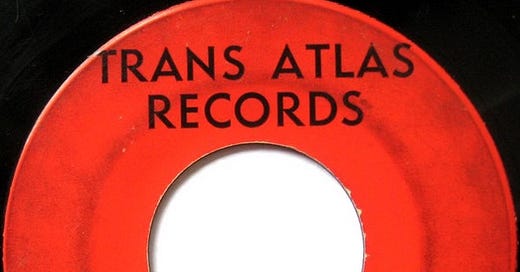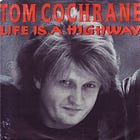Last weekend, while taking a much-needed lunch break from my impending book deadline, my girlfriend and I decided to check out Everything Nice, a cool little records n’ stuff shop in Ellenville, NY. Along with OG pressings of Queen’s Sheer Heart Attack (my second favorite Queen LP after Queen II) and Wings Greatest, I left with a stack of dusty 45s — some which I knew well but didn’t already own, and some which I’d never heard but looked like they might be worth taking a cheap chance on.
“You’re To Blame” b/w “Revived” by The Fascinators was one of the latter. Everything about its spartan label design promised a tasty early-sixties treat, maybe doo-wop or R&B, and definitely worth a buck. That both sides turned out to be organ-and-sax-driven instrumentals was no disappointment at all, as I have a definite soft spot for light but mildly greasy snacks of that sort.
There isn’t much info out there about these particular Fascinators — not to be confused with the multi-racial doo-wop group from late-fifties Brooklyn, or any other band of the same name — aside from the fact than that four of them had previously been members of Johnny & The Hurricanes (a Toledo, Ohio combo best known for such peppy Eisenhower-era instro grinders as “Red River Rock,” “Reveille Rock” and “Beatnick Fly”), but bailed when sax-playing bandleader Johnny Paris became too much of a pain in the ass to deal with. Paul Tesluk (organ), Dave Yorko (guitar), Butch Mattice (bass) and Lynn Bruce (drums) then hooked up with saxophonist Mike Murdza and started over as The Fascinators, cutting two singles for Trans Atlas Records before vanishing into oblivion.
Unsurprisingly, their sound was pretty similar to that of the Hurricanes, though they seem to thankfully have ditched the Hurricanes’ recurring shtick of “rocking up” traditional tunes like “Red River Valley”. “Revived,” their first single’s b-side, is a group composition, while “You’re To Blame” is an original penned by someone named Craft — who, upon further research, appears to have been Morty Craft, bandleader, producer, arranger, and owner of Warwick Records, the label that had released all of Johnny and the Hurricanes’ hits. (Warwick also released “Wheels,” a big instrumental hit in 1960 for the String-A-Longs, and the Pepper Adams Donald Byrd Quartet’s Out of This World LP, which featured the recording debut of Herbie Hancock.)
Was Trans-Atlas one of Craft’s labels? Did he sign the band under the stipulation that they had to record one of his compositions? Was it even really one of his compositions? I can definitively answer the last question, at least. Because while spinning my 45 of “You’re To Blame,” I had the nagging feeling that I’d heard the tune somewhere before…
And after Tesluk’s chirpy organ repeated the chorus a couple of times, it clicked — 1962’s “You’re To Blame” is almost a note-for-note cop of “You’re So Fine,” a massive 1959 hit for The Falcons, the Detroit vocal whose membership at the time included future R&B greats Eddie Floyd, Sir Mack Rice and Joe Stubbs, the latter of whom was the brother of The Four Tops’ Levi Stubbs, and who would go on to sing with The Contours and 100 Proof (Aged in Soul).
“You’re So Fine,” which was penned by Falcons members Lance Finney and Willie Schofield with another Detroit songwriter named Bob West, has been recorded numerous times over the years by various artists — including Wilson Pickett, who joined The Falcons in 1960 but cut a fine version of his own that ended up on the flip side of his hit 1966 rendition of “Land of 1000 Dances”. But after going down the SecondHand Songs list of everyone that covered it (an extremely wide range of talents that include Johnny Burnette, Steve Alaimo, Dorothy Berry, Ike & Tina Turner, Rita Coolidge and Tony Orlando), there was still another version banging around in my head that wasn’t listed, and which I couldn’t place. And then I remembered: Ah yes, Magic Sam!
Back in my Chicago record store days, we used to regularly get promo CDs from the local blues and jazz label Delmark Records. Their jazz stuff was a little too far-out for in-store play (I don’t think either the store’s owner or our WXRT-loving customers could have hacked more than a minute of Anthony Braxton or The Art Ensemble of Chicago), and some of their blues releases were a little too generic-sounding for my taste. But at some point in 1991 they dropped off a CD of Give Me Time, a posthumous release of home recordings by the late, great Chicago bluesman Magic Sam, and I fell completely in love with it.
Recorded at his Chicago home in January 1968, about nine months before the release of his landmark album West Side Soul, the tapes that make up Give Me Time are wonderfully intimate; it’s just Sam singing his heart out while accompanying himself on his electric guitar. But they are also incredibly poignant, given that the tremendously soulful singer and guitarist (born Samuel Gene Maghett) would be dead of a heart attack at the age of 32 less than two years after they were recorded.
I played that Give Me Time CD all the time in the store. Aside from the obvious talent on aural display, there was something about the music that I found incredibly soothing and centering. Though the tapes were pretty “lo-fi” in quality, Magic Sam’s good vibes came through in vivid color, making it feel like I was hanging out with him for an afternoon and enjoying a few cold pops while listening to the man play some of his favorite numbers. And one of those numbers — and almost definitely the first time I’d heard the song anywhere — was “You’re So Fine,” which of course fit his soulful tenor voice perfectly.
Was it uncool for Morty Craft to rename “You’re So Fine” as “You’re To Blame,” and slap his own name down on the credits? Absolutely, though given The Fascinators’ lack of chart success, I don’t think he profited much from his underhanded move. In any case, I’m happy to have added their version of the song to my 45 collection, and that my chance dollar-bin discovery reminded of that wonderful Magic Sam CD. Hey, Delmark — how ‘bout reissuing Give Me Time on vinyl?
You may also dig…










Dan, Your article today stirred up a pleasant memory for me. Back in 1959, after the release of my first record, I spent an evening backstage at an Alan Freed Rock and Roll Show in New York. Mostly I hung out with Jimmy Clanton, Thomas Wayne, and Dale Hawkins. The four of us sat around a dressing room and talked music non-stop. At the time, there were two records called (You’re) So Fine on the charts. One by the Fiestas, and the other - the one you discussed - by the Falcons.
We got into comparing the two records and when it was my turn I said I like the Fiestas doo-wop version better. I'm telling you, those three guys jumped down my throat with surprising enthusiasm, telling me I was crazy, that the Falcons had the better record, that only a New Yorker could see it the way I did, etc. It was all good-natured, but those guys weren't kidding. To a man, they went for the proto-soulish arrangement on the Falcons record, and found very little to love in the gospely doo-wop sound of the Fiestas. Throughout the evening, the four of us agreed on most everything - but not So Fine.
Hank Davis
(author) Ducktails, Drive-Ins And Broken Hearts: An Unsweetened Look At 50s Music
Trans Atlas was a brief 1962 continuation of Warwick after the parent company of the latter, Seven Arts Record Productions Corporation,* went bankrupt in April 1962. It even continued Warwick's numerical series, which ran from 501 to 681 and then went from 682 to 699 as Trans Atlas.
Morty Craft died as recently as 2022, aged 101. Can't think of many other record industry figures who made it to a hundred.
* Unrelated to the movie production company Seven Arts Productions which briefly owned Warner Bros. in the late '60s, despite misinformation online.